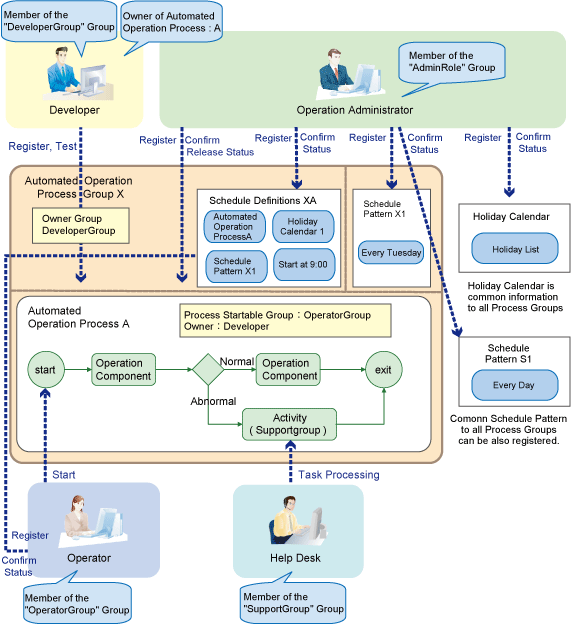Determine the authority given to user who will use this product.
Users of this product must have the user information on the directory server which is used as the Systemwalker Runbook Automation Operation Management Server repository. Users must also belong to at least one group.
There are two types of groups as below. Groups are used to determine the person in charge of a task when a process is executed.
Groups managed on the directory service
Local groups managed on the Operation Management Server database.
Standard Groups used in Systemwalker Runbook Automation
Group Name | Description |
|---|---|
IflowUsers | This is an external group that is managed on the directory service. Systemwalker Runbook Automation user accounts must belong to this group. |
AdminRole | This group is also managed on the directory service. It is created when setting up management server. Users that belong to this group are assumed to be administrators. |
Information
The user identity attribute (RDN) information on the directory server is user name used to login to Systemwalker Runbook Automation Console.
Note
The at sign ("@") cannot be used at the start of user names or group names. Only alphanumeric, hyphens, and underscores ("_") can be used in user names and group names.
There are two types of authorities given to each user, authorities determined by group and authorities which are independent of the group which user belongs to.
The Authority Determined by Group
There are four types of Authority determined by Group
System Manager Authority
Members of AdminRole group have this authority.
Users with this authority can manage automated operation process such as registering/updating/deleting/publishing automated operation process groups and automated operation process and can manage basic setting for using schedule definition to startup automated operation process automatically on time such as schedule definition holiday calendar and such as registering/updating/deleting schedule pattern.
Process Group Owner Authority
Members of Process Owner Group has this authority.
Users with this authority can manage operations such as registering/updating automated operation process to automated operation group.
Process Execution Authority
Users who belong to process execution group specified in definition of automated operation process have this authority.
Automated operation processes with specified process execution groups can be executed the following operations only by users who belong to that group or by system manager.
It's possible to start up Automated operation process.
It's possible to register/update/delete schedule definitions for automated operation process
In addition, Automated operation process which does not have specified process execution group can be executed these operations by all users.
Task Operator Authority
Users who belong to group specified in definition of Activity of automated operation process have this authority.
Task Operator can operate tasks and handle the progress of automated Process.
The Authorities which are Independent of the group
There are three types of authority which are independent of the group
Process Definition Owner Authority
Users who register process definition in Management Server of Systemwalker Runbook Automation gain this authority.
Process Definition Owner and System Manager can change a process definition owner to another person.
Users who have this authority can execute automated process in draft situation.
Schedule Definition Owner Authority
Users who register schedule definition in Management Server of Systemwalker Runbook Automation gain this authority.
Users who have this authority can update/delete/start directly/hold/validate/invalidate schedule definition.
Schedule Definition Owner Authority can not be changed owner to another person.
Users who have this authority can execute automated process in draft situation.
Process Instance Owner Authority
Without using schedule definition, after executing automated operation process, Process Definition Owner will become the instance owner of automated operation process and have this authority.
With using schedule definition, after executing automated operation process, Schedule Definition Owner will become the instance owner of automated operation process and have this authority
Process Instance Owner and System Manager can change a process instance owner to another person.
Users who have this authority can confirm the status of their own automated operation process.
Process Execution authority
Users who execute automation process have this authority.
Process Execution Operator can confirm the status of executed automation operation process.
Examples of Authority given to users
Examples of authority which are given to each user:
User | Example of Users duty | Necessary Authority |
|---|---|---|
Operation Administrator |
| System Management Authority |
Developer |
| Process Group Owner Authority |
| Process Definition Owner Authority | |
Operator |
| Process Execution Authority |
Help Desk |
| Task Operator Authority |
As above authority, show a following example of workload.
